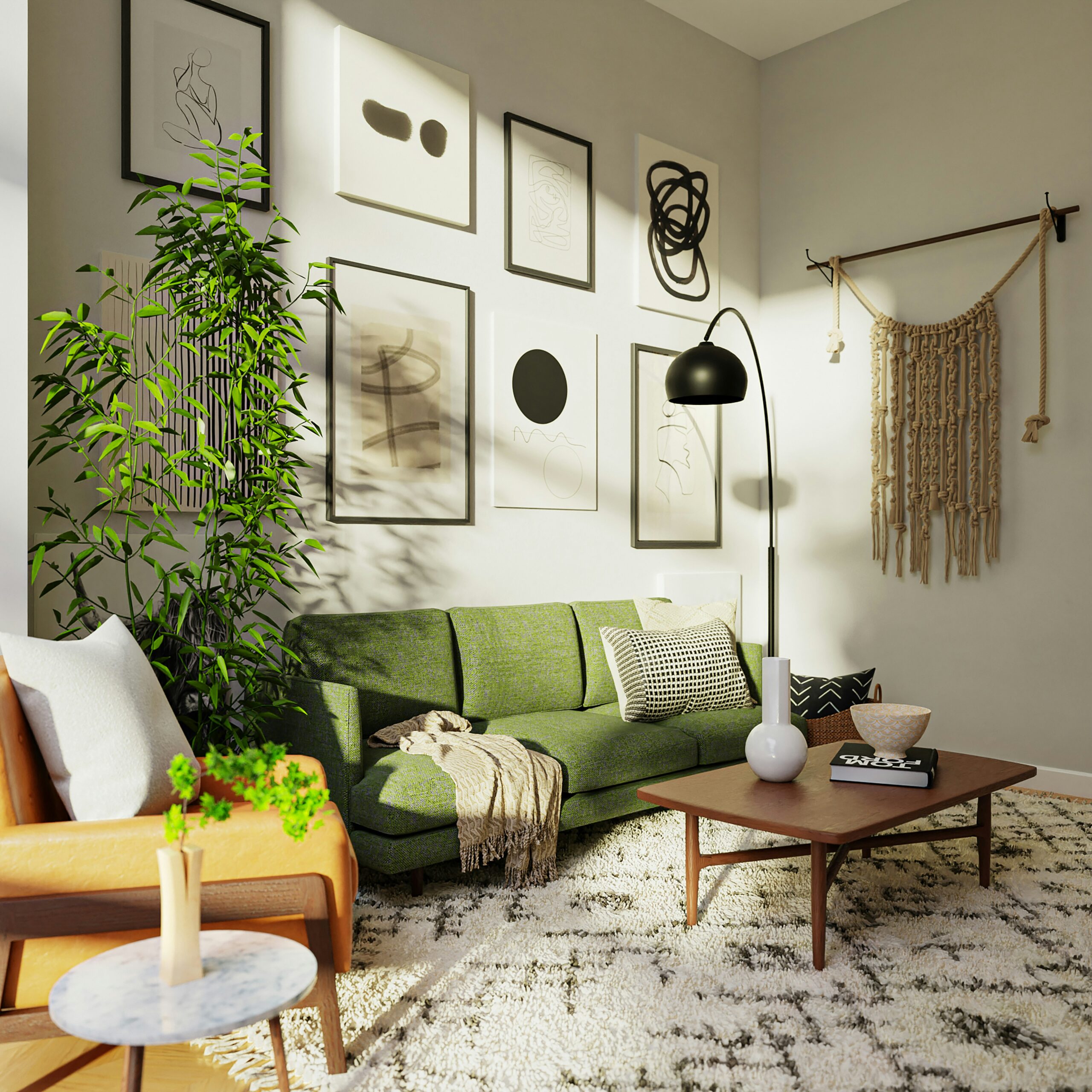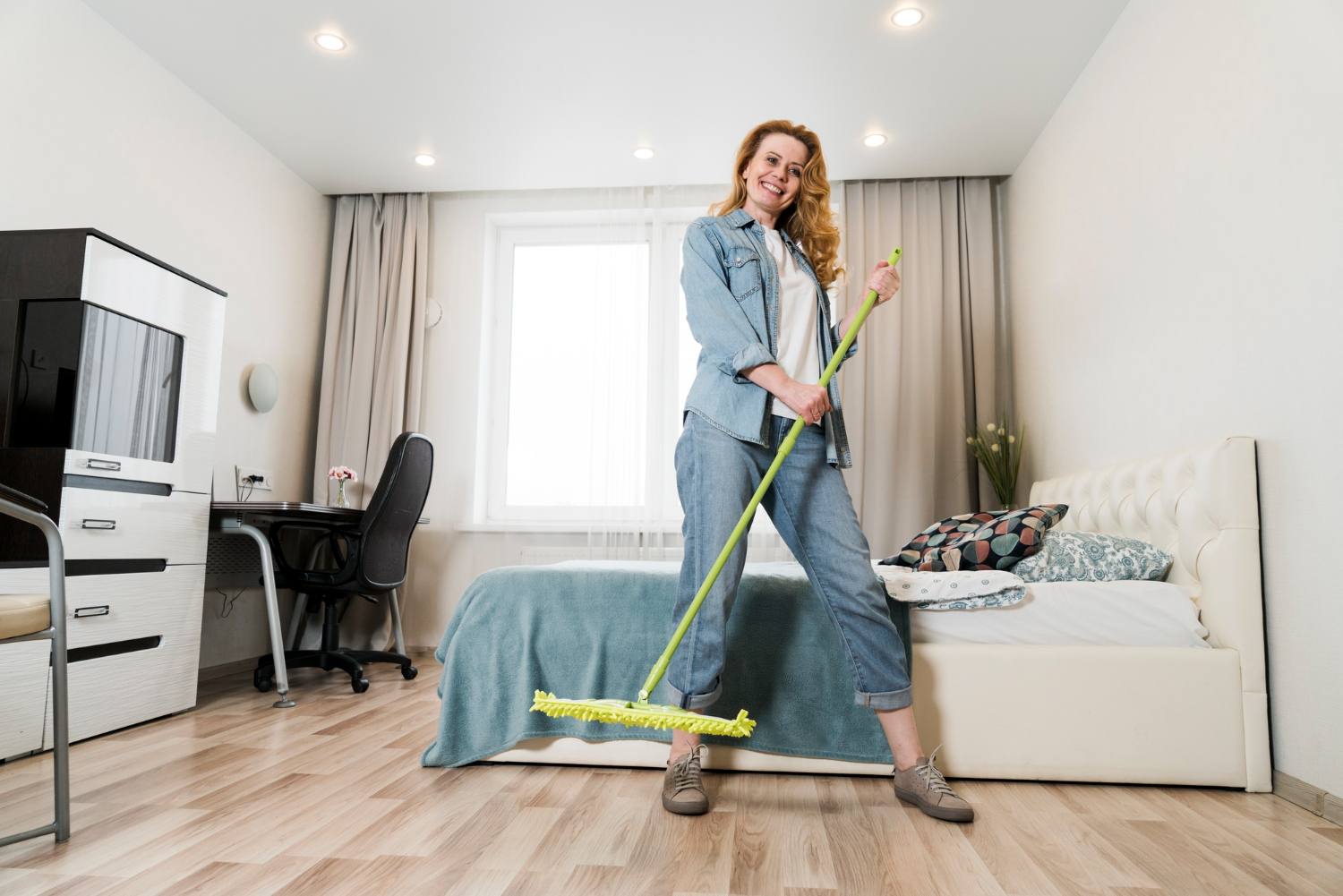- Furnished rentals (bail en location meublé)
- How do you become a professional landlord of a furnished property?
- Status of Professional Landlord
- Benefits of Furnished Lettings for Landlords
- Benefits of furnished rental apartments for Tenants
- Additional resources
Furnished rentals (bail en location meublé)
Do you own a property you’re not currently living in? Have you considered turning it into a furnished rental? This way, you can offer it to a tenant to make it their home, a second home, or even a holiday rental.
The type of contract you’ll need to sign will depend on your chosen usage (dwelling lease, mobility lease, or rental contract for a furnished tourist). Furthermore, the rules for leasing and taxes you’ll need to pay will also vary based on the type of rental agreement you opt for.
Consequently, its wise to learn all you can about renting in France because it differs significantly from what you are used to in your home country.
Tenants sign a lease for a furnished rental or bail en location meublé for one year. And this duration is only binding for the landlord, not the tenant.
To consider a rental property “furnished,” it must contain some furniture.
A furnished dwelling must have at least the following furniture:
- Bedding with duvet or blanket
- Shutters or curtains in the rooms
- Cooking plates
- Microwave oven or oven
- Refrigerator
- Freezer or freezer compartment of the refrigerator with a minimum temperature of -6°
- Sufficient dishes for occupants to eat
- Kitchen utensils
- Table
- Seats
- Storage Shelves
- Lighting Fixtures
-
Household maintenance equipment adapted to the characteristics of the housing (vacuum cleaner if there is carpet, broom, and mop for tiles…)
When renting a property, it’s vital to ensure everything is in good condition and ready for the tenant to move in without nuisance. According to a new decree, the property must be completely furnished, and all the furniture should be in good working order.
Even if one room is empty, the rental will be considered unfurnished. The owner must also repair or replace any faulty furniture immediately. This ensures that the tenant has a comfortable and hassle-free stay.
How do you become a professional landlord of a furnished property?
| Rules applicable to furnished lease | |||
| Furnished residential lease | Mobility lease | Furnished tourist goods | |
| Use of housing | The tenant makes housing his principal residence. | The tenant makes housing his principal residence or his secondary residence. | Minimum: One-month Maximum: Ten months |
| For which tenant? | Any person can be a tenant. | Minimum: One month Maximum: Ten months | The same tenant must not rent the accommodation more than 90 days a year. |
| Lease Duration | The tenant must be in one of the following situations: Vocational training, Higher education, Apprenticeship contract, Internship, Voluntary engagement in civic service, Occupational transfer, or Temporary assignment in the course of professional activity. | The tenant must be in one of the following situations: Vocational training, Higher education, Apprenticeship contract, Internship, Voluntary engagement in civic service, Occupational transfer, or Temporary assignment during professional activity. | Minimum: One year. But if the tenant is a student, the minimum is nine months. |
| Content of the lease | Regulated and specific | Regulated and specific | Regulated and specific |
| Security deposit | Maximum: two months rent (excluding charges) | Forbidden | No limitation |
| Energy consumption | In metropolitan France, housing must have a moderate energy consumption | No limitation | |
| Furnishing | The dwelling must include at least some of the furniture. | There is no list of mandatory furniture. | |
| Advance Declarations | None | Concerning taxes: declare the start of operations and obtain an SIRET number | Income tax, Social Security property tax and ancillary taxes, company property tax (in some cases), and social contributions (in some cases). |
| Content of the real estate listing | Regulated and different depending on whether the ad is written by the owner or a real estate agency | Income tax, Social Security property tax and ancillary taxes, company property tax (in some cases), and social contributions(in some cases). | |
| Rent | Regulated or Free (depending on the municipality) | No regulations apply | |
| Owner’s tax | Income tax; Social Security property tax and ancillary taxes; Company property tax (in some cases); Social contributions (in some cases). | ||
| Termination of the lease at the initiative of the tenant | At any time. Leave to be given with a period of notice of one month. | At any time. Leave to be given with a period of notice of one month. | When the lease expires, tenants are expected to vacate the premises without further notice. |
| End of the lease at the initiative of the owner | At the end of the lease and for 1 of the authorized reasons (take-over to live, take-over to sell, or severe and legitimate reason). Leave to be given with a notice period of at least three months. |
When the lease expires, tenants are expected to vacate the premises without further notice. | The rules on leave and notice shall be laid down in the lease agreement. |
Status of Professional Landlord
If you’re a landlord in France, you can carry out your rental activity professionally by obtaining the status of Professional landlord for furnished accommodation (“Loueur en meublé professionnel”).
To do this, you need to meet three conditions:
- Be registered on the French Companies Register (Registre des Commerces et des Sociétés),
- Generate over €23,000 per year in furnished rental income,
-
Generate more significant rental income than the professional income of the taxable household.
Consequently, unless you have significant property assets, the status of a Non-professional landlord for furnished accommodation (Loueur en Meublé Non-Professionnel) remains more advantageous.
Advantages of Furnished Lettings for Landlords
1. Flexibility
Furnished rentals offer shorter contracts if you’re uncertain about how long you want to rent a place. In France, there are two types of contracts for furnished rentals.
The first is renting to a company or as a tenant’s secondary residence. In this case, you can set the conditions of the contract and its renewal.
The second type is for renting as the tenant’s primary residence, and specific rules must be followed, particularly those imposed by the French ALUR law.
However, you still have flexibility with the duration of the lease. You can tacitly renew it for one year (or nine months for students), compared to 3 years for unfurnished rentals.
It’s a more flexible option, meaning you’re less likely to face the risk of unpaid rent.
A furnished rental contract usually lasts for a year and the landlord can renew it. This lease term is more workable than a mandatory three-year lease for an unfurnished apartment.
The landlord can also perform improvement work with more adjustability between rentals.
Lastly, landlords can request a two-month rent security deposit for a furnished rental instead of one month’s rent for an unfurnished property to secure their furnishings and appliances.
2. Higher rental revenues
Furnished luxury apartments in France are in high demand among expatriate executives, corporate clients, and international students.
So it’s unsurprising that furnished apartments usually cost 10% to 30% more than unfurnished ones? This is especially true in rent-controlled areas, where landlords can charge higher rent for furnished apartments because the reference rent used to calculate the rent cap is higher. This allows them to maintain their revenue.
3. Favorable tax regime
Landlords can set a higher rent price based on the quality of the equipment and furniture provided and take advantage of tax benefits, resulting in paying little to no tax on the rental income.
It’s a win-win situation for both landlords and tenants!
Owners of furnished rentals can benefit from an advantageous tax regime, including the status of non-professional renter (loueur en meublé non-professionnel) or professional renter (loueur en meublé professionnel), which can lead to tax reductions and other tax advantages.
Do you know that if you rent furnished apartments in France, your revenues are not declared in the property tax category? Instead, they are considered commercial and industrial revenues (BIC), even if you are not a professional landlord.
If you are a non-professional landlord, you can take advantage of Loueur en meublé non-professionnel status and a more favorable tax regime than unfurnished rentals.
This means that landlords have two tax regimes to choose from. The first option is the “micro BIC” regime, which is more straightforward and offers an automatic deduction of 50% on the taxes due related to your rental activities.
The second option is the “régime reel,” which is applicable in 85% of cases and can help landlords avoid paying too much tax on their rental income.
The micro BIC system
If you rent a property in France and generate income from it, you are subject to a special tax rule called the “micro-BIC scheme.” This scheme is particularly beneficial if the amount you earn from renting doesn’t exceed €70,000 per year. Here’s how it works for different types of landlords:
-
Non-Professional Landlord
Suppose you rent out property, but it’s not your primary business (meaning you’re doing it more as a side activity). In that case, the micro-BIC scheme automatically reduces your taxable rental income by 50%. So, if you earn €70,000 from renting, you only need to pay tax on €35,000 of that income.
-
Professional Landlord
Even if renting out property is your primary business, as long as your annual rental income is below €70,000, you can reduce your taxable income by 50% under the micro-BIC scheme. Like the non-professional landlord, you would only be taxed on half of your income.
“Régime réel”
The “régime réel” scheme helps landlords (whether professional or non-professional) reduce their income tax by allowing them to deduct actual expenses related to renting out property. This can lead to substantial tax savings, especially if their rental expenses are high.
Here’s how it works for both types of renters:
-
Non-Professional Landlord
If renting out property is not your primary business, you can use the “régime réel” scheme to deduct all your rental-related expenses from your rental income. This includes costs like mortgage interest, repairs to the rental property, property management fees, and other related costs.
By deducting these expenses, you lower the total amount of rental income considered for tax, which could reduce the amount of tax you have to pay.
-
Professional Landlord
You can also use the “régime réel” scheme if you are a professional landlord. Under this scheme, you can deduct the rental expenses from your total taxable income.
This includes the same expenses as non-professional landlords (like mortgage interest and repair costs) but also extends to professional expenses such as social security contributions and accountancy fees.
Deducting these costs means you reduce your overall taxable income, which can significantly lower your tax liability.
Lastly, it’s important to remember that any income resulting from the furnished rental, including subleases, is subject to income tax in the industrial and commercial profits (BIC) category.
Advantages of furnished rental apartments for tenants
-
Convenience
Renting a furnished apartment offers convenience and saves time and money. This is particularly beneficial for expats coming to France for a temporary mission with other essential things to focus on rather than investing in furniture.
With a fully furnished apartment, you can simply move in and feel at home without any added stress. Buying new furniture can be pretty pricey, and renting a furnished space can help you save on those initial expenses and moving costs.
-
Flexibility and Time-Saving
Are you always on the go, such as a professional on a temporary assignment or an international student? If so, a furnished rental apartment might be your perfect solution!
A furnished apartment allows you to move quickly without the bother of transporting furniture. It’s a convenient and stress-free way to settle into your new home away from home.
-
Design and Decor
Imagine living in an apartment that not only looks stunning but also serves all your needs without any bother! You can enjoy an artistically decorated space designed to cater to your every requirement.
Is it worth renting furnished? The answer is yes! Furnished rental apartments offer the ultimate convenience, comfort, aesthetics, and flexibility.
Additional resources
If you are interested in more closely related topics, you can find answers to the following questions just a click away:
- I do furnished rentals; do I have to pay the real estate contribution of the companies (CFE)?
- If I rent a furnished apartment, do I have to declare an activity start and have a SIRET number?
- Furnished rentals: what income should be declared?
- Non-professional furnished rental vs. Professional furnished rentals
- What should be included in a furnished rental?
Have you considered what would work best for you? Where do you usually look for rentals? Do you know how to assemble a dossier that impresses agencies or landlords? Are you aware of what to look out for in a rental contract?
Wunderflats is here to help you with these questions and support you throughout your rental search, from the initial planning to the final walkthrough and key handover.
Please note: This article does not constitute legal advice – the information on this page has been prepared solely for your information. As we are not a law firm and act as a platform, we can and may share our estimations, but we cannot give you legal advice for your individual further proceedings.









